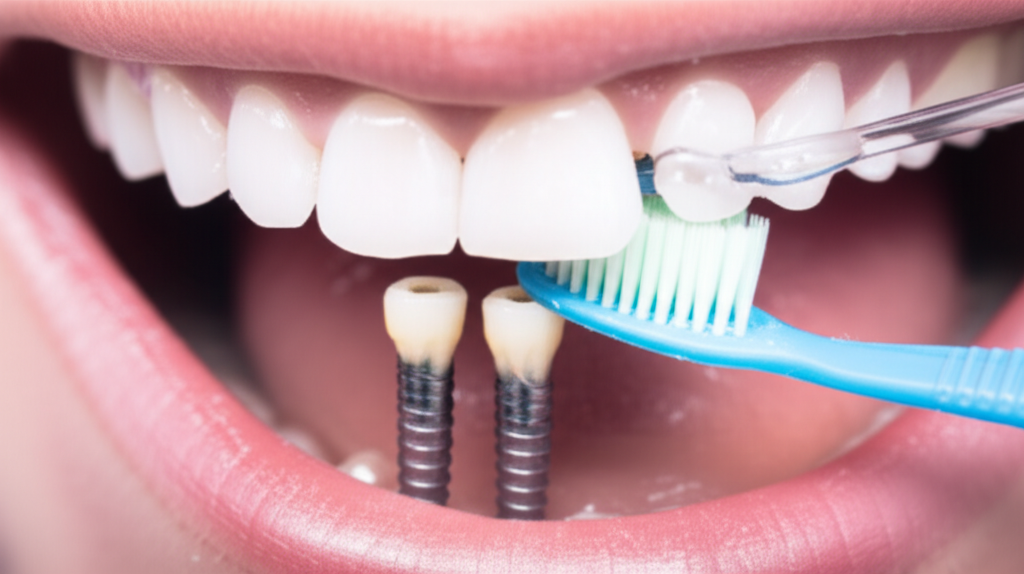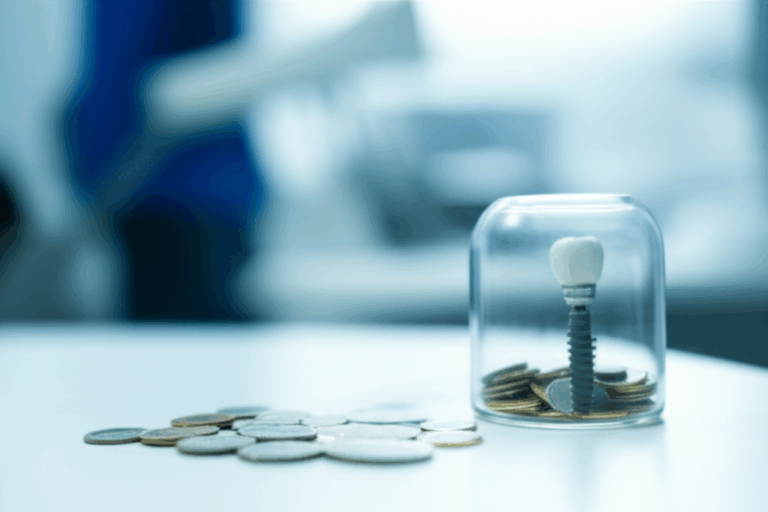
How to Care for Dental Implants: Your Simple Guide to Long Life and Health
That moment your tongue brushes over your new dental implant—you stop and think: Am I doing this right? Are these really as easy as everyone says, or am I missing something? If you’re asking how to take care of dental implants, you’re not alone. Taking care of these little metal wonders might seem scary at first, but with some easy tips, your smile can stay healthy and bright for years. In this guide, I’ll lead you from day-one healing to good habits for life, with simple words and down-to-earth tips.
In This Article
- What Are Dental Implants and Why Should You Care for Them?
- After-Surgery Dental Implant Care
- Everyday Cleaning for Dental Implants
- Long-Term Dentist Visits and Care
- How Lifestyle Affects Your Implants
- Spotting and Fixing Implant Problems
- Who Should Get Dental Implants?
- Your Easy Implant Checklist
What Are Dental Implants and Why Should You Care for Them?
Let’s go over the basics: What, exactly, is in your jaw? A dental implant is a tiny, screw-shaped piece—usually made of titanium or zirconia—that works as an artificial tooth root. Your dentist puts it in your jawbone. After a healing time, they add a crown or denture, so you get a solid, real-looking tooth.
But here’s the thing: Why do you have to take special care of them? While dental implants are very strong and work well 95–98% of the time when you keep them clean, they aren’t indestructible. Think of an implant like a fancy car—it’s built to last, but only if you look after it. Implants can’t get cavities, but they can still get gum problems (like peri-implantitis) and bone loss. Both can mess up your implant.
Quick example: If a dental implant is the root of a strong tree, your daily care is the soil and water that makes it stay tall. Forget the basics, and even the biggest tree can fall over.
After-Surgery Dental Implant Care (First 24–72 Hours)
Let’s focus on the first few days after you get your implant—the “fragile time.” This is when you start to heal, and what you do now really matters.
A. Stopping Bleeding
- Light bleeding? Don’t worry, it’s normal. Bite down softly but firmly on a clean gauze pad for 30–60 minutes. Change it as needed.
- Don’t rinse hard. Rinsing too hard can wash away the clot your body needs to heal.
- Still bleeding? Try a wet black tea bag. It has something that helps blood clots form.
B. Reducing Swelling
- Cold helps! Hold an ice pack outside your cheek for 15 minutes at a time for the first day.
- Keep your head up. Sleep with extra pillows. Gravity will help stop swelling.
C. Helping with Pain
- Take your medicine. Do what your dentist says about pain pills, both prescription and over-the-counter.
- Stick to the pain medicine schedule for the first day. Don’t try to “be tough.”
D. What to Eat
- Eat soft foods: Go for things like yogurt, applesauce, mashed potatoes, smoothies (without a straw!), and cool soups.
- Stay away from: Hot drinks, spicy or crunchy foods, and don’t chew near the implant.
E. Mouth Care After Surgery
- Be gentle. Don’t brush the surgery spot for 24 hours. Instead, swish lightly with a salt water rinse after a day or so—just let it roll around your mouth.
- Don’t use store mouthwash unless your dentist tells you to.
F. Rest and Take It Easy
- Rest up. Take a day or two off and relax.
- Don’t pick up heavy things or work out hard—it could make bleeding or swelling worse.
Tip: Write down any symptoms or questions. If something feels wrong (like bad bleeding or pain that gets worse), call your dentist soon.
Everyday Cleaning for Dental Implants (Ongoing Care)
After you’ve healed, caring for your dental implant is about building easy daily habits. Here’s what to do:
A. How to Brush
- Pick the right brush: Use a soft toothbrush—manual or electric. Its bristles should lightly move around the implant and not scratch it.
- Careful with toothpaste: Use toothpaste that isn’t gritty or too rough. Whitening toothpastes can wear away your crown.
- How to brush: Brush twice a day. Use small, round circles at a 45-degree angle to your gums and implant crown.
- Take your time—two minutes is perfect.
B. Flossing Around Implants
- Use special floss: Try unwaxed tape, implant floss, or superfloss. These slide between your crowns and implant parts easily.
- If you have bridges or more implants: You might need a floss threader to get under connected crowns.
- How to floss: Clean gently along the sides of the implant and under the crown where germs can hide.
C. Using a Water Flosser
Water flossers are great for cleaning out food from tight spots, especially if flossing is hard for you.
- Start low: Use low power at first—more isn’t always better.
- Aim the water at your gum line and around the implant crown.
- Extra tip: Water flossers help clean around tricky spots like bridges or lab-made prosthetics.
D. Using Small Brushes & Picks
- Find the right size: It should fit snug but never force tightly. Your dental hygienist can help pick the right one.
- These tiny brushes clean around implant posts, under bridges, and in between teeth and gums.
E. What Mouthwash to Use
- Go for alcohol-free. Alcohol can bother healing gums.
- For germs: If your dentist says it’s okay, use an antibacterial rinse with chlorhexidine or another gentle germ-killer.
- Avoid rough stuff: Don’t use whitening rinses or anything that could scratch your gums or implant.
Pro Tip: Make a habit that fits your routine. Set phone alarms or stick a note on your mirror until it feels natural.
Long-Term Dentist Visits and Care
Even the best brushing can’t beat the care from a dentist. Here’s why regular checkups are important:
A. Regular Dental Visits (Every 6 Months)
- What happens: Your hygienist uses special tools to clean gently around your implant.
- Why it’s important: Regular visits catch problems early. Professional cleaning removes tartar that toothbrushes can’t.
- Don’t skip! Even if you brush well, you’ll miss some spots.
B. Dental X-rays and Checks
- Your dentist will take X-rays to see if the implant is steady, bone is healthy, or if anything’s wrong.
- Think of this like your implant’s yearly “checkup.”
C. Why Professional Cleaning Matters
- Implants need special care: Dentists use tools made just for implants that won’t scratch them.
- Skipping visits? You could get gum disease, bone loss, and maybe even lose your implant.
- Money talk: Regular cleanings cost way less than fixing problems later.
For more about caring for your teeth and avoiding problems, see this teeth health page.
How Lifestyle Affects Your Implants
A dental implant may look and feel like the real deal, but the way you live can help it last or lead to trouble.
A. Food Tips
- Eat for your mouth: Choose foods high in vitamin C, calcium, and protein to keep your gums and jaw strong.
- Don’t bite hard stuff: Don’t crunch on ice, hard candy, popcorn kernels, or anything that might break your crown.
- After surgery, only eat soft food until your dentist says it’s safe.
B. Smoking and Tobacco
Smoking is one of the worst things for dental implants. Smokers are 2–3 times more likely to have implants fail than non-smokers. Tobacco slows healing and makes it easier to get infections.
If you’ve thought about quitting, let your implant be your reason!
C. Alcohol Drinking
A drink once in a while is okay after you’ve healed, but skip alcohol early after surgery. It slows healing and can mix badly with your medicine.
D. Teeth Grinding (Bruxism)
If you clench or grind your teeth, even at night, you can put too much pressure on your implant. Wearing a custom night guard (like one from a night guard dental lab) can help cushion your implant.
E. Other Health Problems
Some health problems—like diabetes that isn’t under control, bone loss, or immune issues—can make implant problems more likely. Always tell your dentist about any other health issues.
Spotting and Fixing Implant Problems
No one likes surprises, especially with teeth, so here’s how to know if something’s wrong.
A. Signs of Implant Infection (Peri-Implantitis)
Watch for:
- Red, swollen, or bleeding gums where your implant is
- Ongoing pain or soreness
- Pus by the implant (never normal!)
- A crown or tooth that wiggles
Peri-implantitis is like gum disease. Germs can make your gums sore, hurt the bone, and loosen your implant.
B. When to Call the Dentist
Call your dentist if you notice:
- Bleeding or swelling that won’t stop
- New or worse pain after the first few days
- Your implant or crown feels loose
- Any chips, cracks, or damage on your crown or bridge
Don’t hope it goes away—early help makes a big difference.
C. Treating Implant Problems
Sometimes, a deep cleaning or medicine can fix things fast. Other times (like with bad infections), your dentist might need to do more, maybe even a small surgery.
Regular check-ups help catch trouble early so it doesn’t turn into an emergency.
Want to learn more about other mouth problems and implants? Check out this info about dental diseases.
Who Should Get Dental Implants?
Not everyone is right for implants, so here’s who usually does best:
Good Candidates
- Healthy gums and enough strong jawbone
- Good at brushing and flossing
- No out-of-control diseases (like diabetes)
- Non-smokers or ready to quit
When to Wait
- Active gum disease or bone loss—these must be treated first
- Heavy smokers—extra risks, ask your dentist!
- Some medicines for bone diseases can slow healing
Thinking of something else (like dentures or bridges)? Here’s a simple teeth information guide to compare.
Your Easy Implant Checklist
To wrap it up, here’s what really matters:
- Dental implants are valuable—protect them with easy, daily cleaning and don’t cut corners.
- First three days: Be gentle. Control bleeding, rest, and enjoy cool, soft foods.
- Brush and floss: Twice a day with soft tools and non-scratching products. Try a water flosser or little brush if you like.
- See your dentist: Always go for your checkups. Your hygienist helps keep implants safe.
- Lifestyle counts: Quit smoking, eat healthy foods, and wear a night guard if you grind your teeth.
- Act fast: If you spot trouble—call your dentist.
Last thought: You’re not alone. Millions of people have gotten their smiles back with implants, but it’s your habits and care that make them last. With a good routine and help from your dental team, you can enjoy your new teeth for many years.
Ready for your next step? If you have questions or want help keeping your implants clean, ask your dentist. Your future you (and your smile) will be glad you did.
References:
- American Dental Association (ADA)
- Journal of Clinical Periodontology
- Mayo Clinic Dental Health Resources
Was this article helpful? For more everyday advice, check out dental care tips or discover more advanced help at a digital dental lab. A healthy, happy smile is close at hand!








